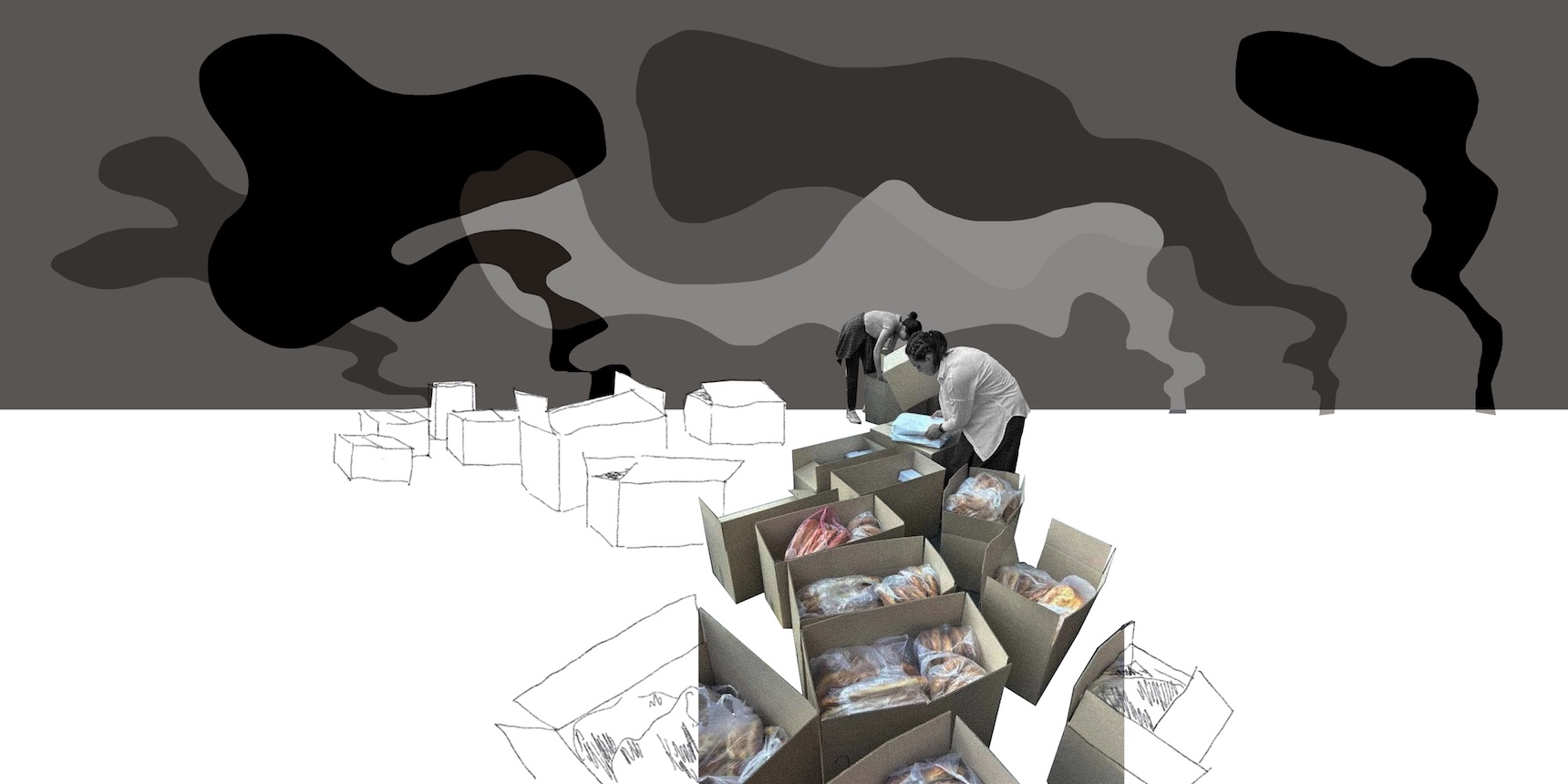
Volunteering has become widespread in Armenia in recent years. However, it has only recently received legal regulation.
The role of volunteers became especially evident after the Azerbaijani attack on Nagorno-Karabakh on September 19, 2023. During this time, volunteers played a crucial role in registering over 100,000 forcibly displaced people from Artsakh and providing them with urgent support.
In fact, the Ministry of Labor and Social Affairs even created a platform called “Become a Volunteer” to facilitate volunteering opportunities.
The main page of the platform states: “If you wish to support forcibly displaced people from Nagorno-Karabakh through voluntary work, please follow the link to provide the necessary information to the Ministry of Labor and Social Affairs.”
Eyewitnesses testify that during the challenging days at the end of September when the displaced from Artsakh were streaming into Armenia, the volunteers displayed remarkable dedication. They diligently registered people’s needs, distributed essential items such as SIM cards, medicine, and food, offered psychological support, and more, all at various locations. Sometimes, they simply provided comfort through hugs and warmth to compatriots who had been on the road for days. All of these efforts were carried out tirelessly, around the clock.
School-age children, some as young as 9 were also involved in the volunteering effort.
Undoubtedly, their efforts were selfless, driven by the genuine need to assist, without any desire for certificates or work experience credentials. They volunteered because they recognized the necessity of their work, and the sense of making a meaningful contribution during challenging times, radiated from their faces.
While these volunteers don’t receive financial rewards or expect gratitude, the rights of citizens engaged in volunteering are now safeguarded. Starting from October 13, 2023, the Law “On Voluntary Work” has been in effect.
Before the adoption of this law, Armenia lacked a unified legal framework governing voluntary activities. Various aspects of volunteering were regulated by separate laws and regulations.
The law now provides a clear definition of voluntary work, categorizing it as unpaid, non-compulsory, and non-obligatory labor conducted in adherence to the Law on “Voluntary Work”.
Which Institutions Can Engage Volunteers?
- state or local self-governing bodies,
- state or community based non-commercial organizations or other non-profit legal entities (NGOs, foundations, political parties, etc.).
An example of this can be seen in a statement by the ruling Civic Contract party during the municipal election campaign in Yerevan. They expressed the need for volunteer support in their campaigns, stating: “If you believe that we should continue to improve Yerevan together and are ready to invest your time and abilities in this matter, please complete the form and our team will contact you.”
- Profit-seeking legal entities with 100% state-owned shares. This point relates to closed joint-stock companies (CJSC).
Private companies are not permitted to recruit volunteers, and any violation of the law is subject to fines as defined by the Law on Administrative Offenses.
What is the minimum age requirement for volunteering according to the law?
Anyone aged 16 or older can volunteer. For those below 14 years of age, their participation in voluntary work requires written consent of one of their parents, foster parents, adoptive parents, a guardian, or a guardianship body. Those aged 14 to 16 may volunteer with written consent from one parent or the guardian.
Organizations often seek volunteers with specific skills, such as proficiency in Armenian and English, organizational and communication skills, and a sense of responsibility.
When enlisting volunteers, these organizations not only outline the prerequisites but also highlight the skills that participants will develop through their involvement. For example, they emphasize the opportunity to gain valuable experience, expand their professional network, attain certification, and potentially secure future job prospects based on performance.
Organizations typically require job experience from individuals entering the job market. It’s important to note that, by law, volunteering can be considered work experience. However, this experience is viewed separately from formal work experience, especially in the context of pension eligibility.
Yet, according to Tiruhi Nazaretyan, Vice President of the Confederation of Trade Unions of Armenia, the existing law falls short of fully safeguarding the rights of volunteers.
The law doesn’t mandate a formal contract between the organization and the volunteer. While the work is voluntary, the critical aspect here is the “work” itself. Volunteers perform unpaid work, and the organization they assist benefits from the work carried out by the volunteers.
Nazaretyan notes that volunteers are exposed to similar risks as regular employees. She explains that a young volunteer may be lured in with promises of volunteering for a few months with the prospect of being hired as an official employee afterward. “In good faith, the volunteer dedicates their time with the hope of attaining official employee status. There have been cases where organizations have assigned them the responsibilities of regular employees, paid them meager, unofficial wages, and eventually let them go. Thus, the employee’s aspirations are exploited over months,” Nazaretyan points out.
However, Deputy Minister of Labor and Social Affairs, Ruben Sargsyan believes that the state’s role in this matter is to foster an environment conducive to the growth of volunteerism rather than imposing barriers.
“This law is a milestone achievement,” Sargsyan says. “We have been working towards it since 2006, and we’ve finally succeeded. It establishes the rules of engagement.” He goes on to mention that the number of citizens engaging in voluntary work is on the rise each year.
Sargsyan also clarifies that both employed and unemployed individuals participate in volunteer work. Volunteering is a means of promoting self-organization among citizens and serves as a gateway to becoming more actively involved in public or private life. It should be noted that volunteering is not an employment relationship and does not entail an employment contract.”
Once significant concern with volunteering pertains to the sale of a volunteer’s certificates. These are sought after for admission to international educational institutions or employment within international organizations, where volunteering is regarded as an asset. The law addresses this issue by establishing a transparent process for obtaining certificates through an electronic system with a standardized format.
A volunteer is entitled:
- To access necessary information, advice, or support from the organization to perform voluntary work.
- To participate in the development or execution of voluntary or other programs with mutual consent from the organization.
- To receive funds from the organization required for carrying out voluntary work, along with compensation for additional expenses resulting from their voluntary activities.
- To seek damages,
- To participate in programs and events organized by the organization with the consent of both parties.
- To obtain a reference or a letter of recommendation from the organization regarding their volunteer work within five working days after submitting a written request.
- To be insured against potential risks associated with volunteer work in line with the terms and procedures stipulated in the volunteer work contract.
It’s important to note that the protection of rights concerning volunteer work and the resolution of disputes related to volunteer work are subject to the jurisdiction of the court, in accordance with the Code of Civil Procedure.
Responsibilities of the volunteer
The volunteer must:
- Not distribute or publish personal data or other information containing state, banking, insurance, commercial, medical, legal or legally protected secrets that became known while performing voluntary work.
- Perform voluntary work in compliance with the requirements of the legislation of the Republic of Armenia regarding health care and safety,
- Compensate for any material damage caused to the organization as a result of actions or inactions while performing voluntary work.
- Use the property and funds allocated by the organization purposefully and conscientiously.
- Participate in educational programs or other awareness activities organized by the organization related to the voluntary work, if it is a mandatory prerequisite for performing the given voluntary work.
- Carry out other duties related to voluntary work as defined by this law or other laws.
- Undergo a mandatory medical examination in accordance with the procedure established by the government, if the voluntary work will be performed in positions that require an initial and periodic medical examination.
The law also defines the rights of persons with disabilities to volunteer. However, citizens with disabilities face significant challenges in realizing their rights due to the persistent issue of accessibility in the country. For individuals with mobility, visual, and hearing impairments, the opportunities for volunteering are extremely limited, regardless of the provisions offered by this law or the Labor Code.
White Paper
Volunteering in Armenia: Key Issues And Challenges
This policy analysis aims to explore the main reasons people volunteer, how volunteer work is regulated and the key issues the volunteering sector faces in the Republic of Armenia.
Read morerelated articles
With Every Act of Volunteering, a Person Gives a Part of Their Soul
What motivates people to give of themselves and their time in the pursuit of helping others and their communities? Three women explain.
Read moreDiscovering Armenia Through Stories
What does it mean to be a volunteer in a country and a society that is vastly different from your own? Sofia Bergmann reflects on her experience in Armenia.
Read moreMission Incomplete: Armenian Police Reforms
The Pashinyan Government's reforms of the police and other institutions promised to bring long-awaited changes to Armenia. While some progress was registered, there have been setbacks and backsliding, particularly after the defeat in the 2020 Artsakh War. Police reform has been no exception.
Read moreAssessing Quality or Posing Challenges for Educators?
In 2022, the Armenian government introduced a voluntary teacher certification program. Teachers who pass with high scores receive higher salaries, however, problems persist in the process.
Read moreA Fancy Resort, Protesting Villagers and Politics on Mount Aragats
Armenia’s newest ski resort, located on the slopes of Mount Aragats, partially opened last year. While Myler Mountain Resort is expected to become a hub for winter sports enthusiasts, complaints from villagers about the way it is being developed have gone unheeded.
Read more







